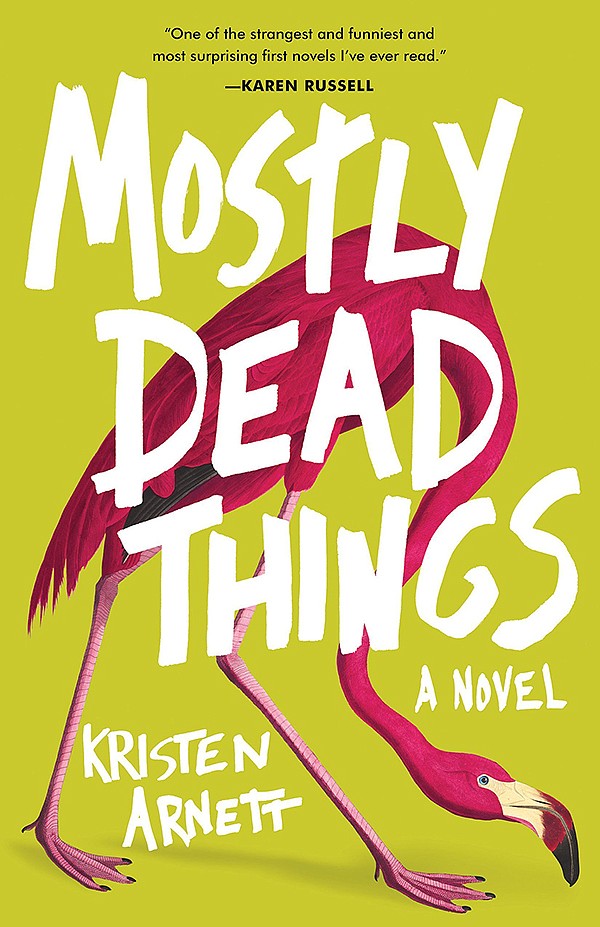Mostly Dead Things
by Kristen Arnett (Tin House)
The Mortons are just a typical family, a mom and dad and son and daughter and a couple of grandkids, living somewhere near Orlando, Fla.
The family business is taxidermy. In a shop teeming with skillfully mounted critters of every kind, Dad teaches his craft to daughter Jessa: "Our heart," she says, "was in the curve of a well-rendered lip smoothed over painted teeth." But Jessa will lose her heart-to the same girl her brother, Milo, falls in love with, the beautiful and broken Brynn.
Brynn will abandon them all, and later so will their father. The question of how the Mortons collapsed and whether they can rebuild themselves is the subject of Kristen Arnett's debut novel, the weird, funny and, in its own macabre way, warm-hearted "Mostly Dead Things."
Arnett, a librarian who lives in the Orlando area, is a widely published essayist, blogger and short-story writer. She held the book launch for her first story collection, "Felt in the Jaw," at her neighborhood 7-Eleven, and that gives you a sense of the setting of this novel. It's not the theme park Florida or the posh suburb Florida or the beach Florida, it's the endlessly muggy, buggy Florida where everyone's behind on their bills and high school kids entertain themselves by drinking cheap beer until they feel brave enough to tease the gators in the local lake.
"Mostly Dead Things" opens with a vividly detailed scene in which young Jessa and Milo are getting their first formal lesson in taxidermy as their dad skins out a deer. Milo bails early, disgraced when he vomits. Jessa, though, has the knack: "Leaning forward, I braced my arm against the cool metal of the table and looked into the cavity where the flesh separated from the skin. In the dark heart of its carcass, I saw my future mapped out in gristle."
The chapter also is the first virtuoso display of Arnett's masterful handling of structure, as she whips the reader with one quick cut from that childhood scene to the day a couple of decades later that Jessa discovers her father at the same work table, a gunshot wound in his skull, a note for Jessa next to him.
His death is the family's second great loss. Years before, Brynn packed up and left without a word of warning, and they haven't heard from her since. She practically grew up with the Mortons, mostly ignored by a mother busy with the kind of boyfriends Brynn says "made her want to lock the bathroom door when she showered."
The friendship between Brynn and Jessa is deep, their sexual relationship passionate. But Brynn marries Milo. "I knew that if she stayed with Milo, she'd always be close," Jessa tells us, "that I'd never lose her, even if I couldn't have her in the exact way I wanted." Like so many other things, it doesn't work out as Jessa hopes. Years later, the kids Brynn abandoned, teenage Lolee and almost-grown Bastien, are constant reminders of her absence.
Finding her father dead just adds another layer to Jessa's mourning. Even as she sinks into a cycle of heavy drinking and hangovers and abandonment of housekeeping and hygiene, she's a wryly engaging narrator.
After her husband's suicide, Libby Morton's grief manifests in an original fashion. Jessa comes to work one morning to find her mother sitting in front of the taxidermy shop's display window, smoking thoughtfully. Behind the glass is her handiwork: a stuffed mountain lion positioned to look like it's having sex with a goat, as a wild boar ogles them through a pair of binoculars.
Libby's lewd take on taxidermy escalates. She not only rearranges specimens, she ornaments them with everything from craft supplies to bondage gear and other sex toys. She misses her husband, Libby tells Jessa, but he was a control freak, and she's more than ready to express herself.
Jessa's annoyance becomes alarm when a local art gallery owner shows up, eager to put on an exhibition of Libby's work. The idea is disturbing enough; the gallery owner, Lucinda Rex, looks to Jessa like "a beautiful, dangerous predator." Nevertheless, Jessa and Lucinda soon become lovers, but Lucinda won't relent about Libby's exhibition. Jessa believes it will be a disaster, a carnival of shame.
It is a disaster, but not the kind Jessa expects. Sometimes, though, as a good taxidermist knows, breaking things down is the only way to put them back together. Sex makes us crazy and loss crushes our hearts and love, maybe, gives us a way to reshape ourselves. We're all a lot the same, under the skin.

